|
There
cannot be many people who have lived in and around Rooksbridge during the
last
100 years or so, whose lives were not touched by the existence of
the Cheddar Valley Dairy Company.
I worked at the dairy for 33 years from 1960 -1993.
Some of my colleagues had been there far longer! During that time I got
a fairly general education in the goings on at the dairy!
Apart from a spell of five or six years in maintenance I was employed as
a driver.
My regret now is... I never took many photos or kept any kind of
records while I was there!
So from memory
and with the help of Mr Richard Brown and others, I hope here to give an outline of the
history, the work and some of the characters on which the dairy depended.
If you have a story to tell about the dairy, or can add to this history
of the Cheddar Valley Dairy. Do please get in touch.
John (Fred) Rigarlsford
During its 120 year history, the dairy situated
in the heart of dairy country, would become one of the largest
manufacturers and suppliers of cheddar cheese, butter, cream and other
dairy products in the south west. It also became one of the largest
employers in the area. Many of its workers and sometimes their families, spent their whole working lives
there.
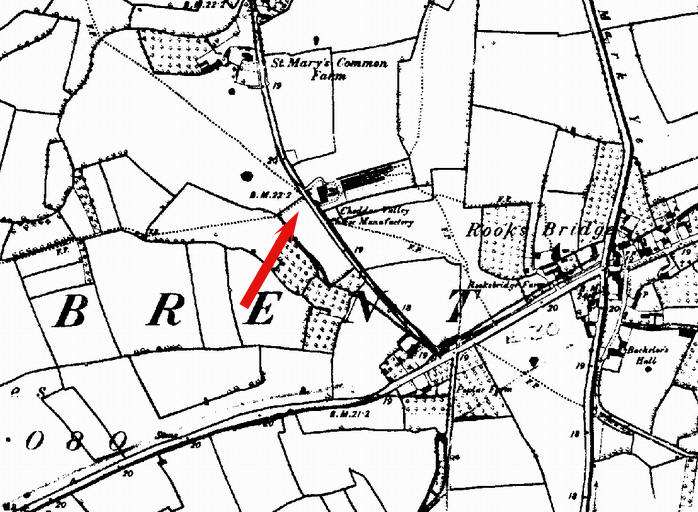
From an OS map of 1880. Note the
footpaths radiating across the fields from the dairy. In the days before
motor transport was introduced, many workers would walk from surrounding
villages to work at the dairy.
|
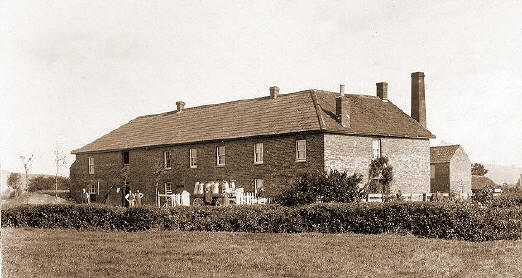
The dairy circa: 1900
Photo courtesy: R Brown.
|
A brief
History
Situated in 'Factory Lane' on what is
now the site of the 'Mendip Business Park' in Mendip Road, the
dairy was first established by two local farmers Messrs Arney and
Clothier. And later, joined by Mr John Wood of East Brent
(John Wood moved back to Derbyshire in about 1892, Where he
subsequently had a milk business in Ashbourne before being put out
of business when Nestle built a factory in the town) Andy Wood.
|
Edward Clothier and William Chappel Arney
built the cheese "Manufactory" in 1870 at the site of a farmhouse in Factory
Lane. By 1874, Messrs. Clothier and Arney were manufacturing cheese
at the factory with milk supplied by local farmers, from an estimated 850 cows . At times there were also upwards of 500 pigs
kept there, to be fattened on the whey.
Because of the abundance of whey and skimmed milk from the production of
cheese and cream etc. most farmers in the area kept a pen or two of
fattening pigs.
In fact a dedicated pig fattening unit was built opposite
the dairy in 1935, where until 1980 upwards of 1000 pigs at a time were fed with whey
piped direct from the factory into the pig houses.
By 1889 the dairy was occupied and run by Messrs Boley and Wood.
The Cheddar Valley Dairy Towards the end of the
1800's the production of butter, cream and milk was growing and it became
known as the Cheddar Valley Dairy Co Ltd when the Cox family,
among them William and Mary Cox from High Littleton became major
shareholders.
They had set up ‘Cox and Sons’ Cardiff Milk
Supply. with a number of retail shops and outlets in the City of Cardiff.
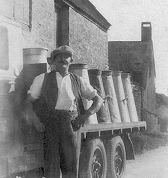 |
The milk for Cardiff, supplied by CVD for many
years, was sent in churns via Rail from
Brent Knoll Station. In the early days the churns were transported to
the station by
horse and cart.
This photo of a proud
George
Emery is undated. Note the 17 gallon churns riding with no visible
means of constraint ! The lorry was built on what appears to be a 6
wheeled chassis? Which would have been unusual in those days.
Photo courtesy: Margery Fear. |
In the early 1900's, The Cox family were
joined by directors, Gilbert Brown of Cheddar and John Counsell of the
'Manor' Lympsham, who remained active in the company until the 1960's
Kelly directory of 1902 states that the
manager of CVD in 1901 was a Walter Mitchell?
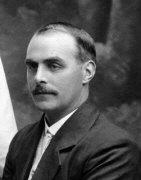 |
Soon after this
in 1904
Charles Emery
become the manager, and then a director of the Cheddar Valley Dairy.
'Charlie' ran the dairy for just over 50 years through two world
wars until he died in 1954. Charles and his older brother Fred
had began a dairy business at Manor Farm Tarnock in the early 1900's.
Charles was regarded as an expert cheese maker and pig breeder.
He was also a prominent Freemason.
Photo courtesy: Margery Fear.
[The Emerys were a large and active
family in the village. For more...Click
here] |
About 1934, a managers house, 'Brent Holme' was built on the site.
And the old existing farmhouse and living quarters became part of the
factory, housing the extended cheesemaking room and
cheese store.
| When Charlie Emery died in
1954 his
son David took over the management of the dairy.
Photo courtesy: Margery Fear.
|
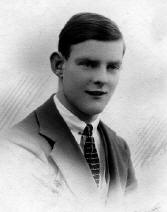 |
In 1958, The Cheddar Valley Dairy was taken over by Horlicks Farms and Dairies of Slough.
They also owned the cheese dairy and
a Cattle breeding Station at 'Hort Bridge' Ilminster Som.
(The cattle breeding centre at Ilminster provided an Artificial
Insemination service to farmers).
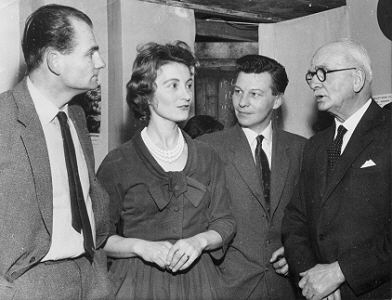 |
By 1959 Richard Brown was
manager and Geoffrey Raffel was the under manager.
Richard Brown remained manager until the late 1980's when he took up a
post with Chewton Mendip Dairy as a cheese consultant.
Here we see: Richard and Mrs
Brown, Geoffrey Raffell and Gilbert Brown
Photo courtesy: R Brown.
|
The expansion into
doorstep deliveries. After the war, improved hygiene and
distribution standards were introduced countrywide. Previous to this,
milk was delivered daily to dairymen and customers mainly,
un-refrigerated and in churns. Improved methods of transport, pasteurisation, cooling of milk and sterilising of equipment
made processing more efficient, making it possible for milk
to be stored for longer and distributed over greater distances, .
In addition to Cheese, cream and buttermaking, the installation of an APV continuous pasteuriser and
a
mechanised bottling system in the 1950's and early 60's enabled a period of
expansion by the Rooksbridge dairy into further retail and doorstep deliveries
etc.
Beside supplying bottled milk etc. to independent dairymen, a number of local dairy businesses were acquired or merged with
the existing retail depots and outlets owned by Horlicks and CVD.
Greenway Dairies of Taunton, Courts Dairy at Burnham on sea and Rawles Dairy at Minehead were bought
and run by CVD. As were dairies operated by Highbridge Bacon Co. Ltd at
Highbridge and Weston Farmers Dairy in Locking Road Weston super mare.
By the early 1960's, the Horlicks Farms and Dairy division would have retail
rounds depots
and shops
at: Burnham, Cheddar, Clevedon, Glastonbury, Nailsea, Taunton and Weston super
mare. To supply all these depots etc. The Rooksbridge dairy was now employing over 120 people and new
offices, maintenance workshops, canteen
and restroom facilities were built in 1968. And a brand new high speed
bottling unit was planned.
The acquisition of Taylors Dairy of Weston super mare
was one of the early larger retail dairies to be bought by CVD.
This
combined with the Weston Farmers Dairy, would under the name of 'Horlicks
Farms and Dairies' become the largest
doorstep delivery operation in Weston.
At its peak in the 1970's, to serve Weston alone, a fleet of nearly 60 milk floats would
operate daily from the depot at Locking Road.
The Locking Road premises became the Headquarters of the Somerset retail
operation managed by Mr John Horlick. (No relation)!
|
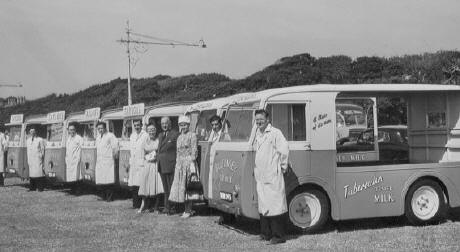
Seen here are Mr Cyril Taylor and some of the staff and
milk floats from Taylors Dairy on display at the annual June Dairy
Festival in Weston super mare in the 1950's
Photo courtesy: R Brown. |
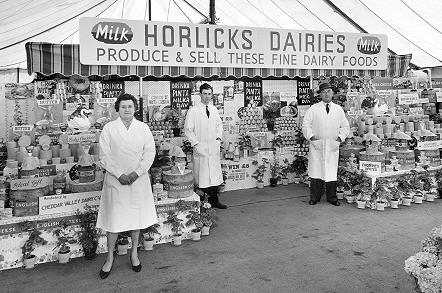 |
A display of Cheddar Valley Dairy
products at the Dairy Festival.
Included:
Traditional truckles of cheese in 60lb, 9lb and 4lb sizes. Milk,
butter and cream including novelty 'midget cheddars' and 'Clotted
Cream by post', popular with visitors.
Cyril
Taylor (Weston retail manager) aided by a young assistant and Mrs
French (Manager Cheddar)
Photo courtesy: R Brown.
|
Cheese making.
The end of an era!
In 1972 the Horlicks Company was
bought out by the Beecham group. Mainly for its Pharmaceutical division based
at Slough. The sale included the Horlicks Farms and Dairies division including
the Rooksbridge dairy and
its retail
division. and also the
Cheese Dairy and the Cattle Breeding centre at Hort Bridge, Ilminster.
Maybe we had not realised it at the time, but the
British dairy industry had reached its peak at around this period.
With increasing foreign dairy produce imports and competition from supermarkets,
with their strong
selling and purchasing powers adding further pressures on producers and
suppliers margins... the decline in doorstep deliveries and the
profitability of the old
traditional ways of producing dairy products had
begun. Changes had to be made to the way dairies operated.
Butter and cream manufacturing were among the first dairy products to
be phased out at Rooksbridge. These had always been made in small batches,
in keeping with the traditional farmhouse style, which was labour
intensive.
Next came the end
of traditional cheese making at Rooksbridge after over a 100 years.
In 1981 cheese production ended at Rooksbridge and was moved to Ilminster.
In order to stay viable, Beechams had invested more than a million pound in
upgrading the cheese making operation at the Ilminster dairy. A fully
automated mechanical cheese making process was installed. Which when
running, virtually mass produced block cheese with hardly any manual intervention!
Milk went in one door and literally 'supermarket ready' vac-packed blocks
of cheese came out of the other!
Another effect of ending cheese, cream and butter production at
Rooksbridge was.... skimmed and semi-skimmed milk for bottling had to be
bought in! This was at a time when the promotion of low fat products was
getting into full swing.
The early 70's had also seen the phasing out of traditional churn collections from the
farm. Local farmers had to install refrigerated bulk tanks from which
the milk would be collected by tankers operated by the Milk Marketing
Board.
Due to the extra expense of installing the new tanks and access needed
etc. many of the small dairy farmer suppliers, were forced to called it a
day!
Because of the way that raw ex-farm milk was now collected and
distributed under the national control of the Milk Marketing Board. The long
standing contracts
and connections between the many local farmers and CVD had to be ended.
Milk would now have to be bought in by tanker from the MMB. with no
choice of suppliers as before.
By now the dairy was solely reliant on liquid milk products and
sales.
Milk was produced in:
- bottles for doorstep delivery,
- non-returnable polyjars, cartons mainly to shops and
supermarkets
- and 3gall and 5
Gallon milk-pak containers for catering establishments
| To keep the business viable, a purpose built
Bottling Hall was erected on land adjoining the dairy. It was
commissioned in 1969
With the installation of a high speed bottling
line, capable of an output of 1000 crates an hour, production was able to keep up with the increasing demands
made by supplying a wider area and larger wholesaler contracts.
Photo courtesy: R Brown.
|
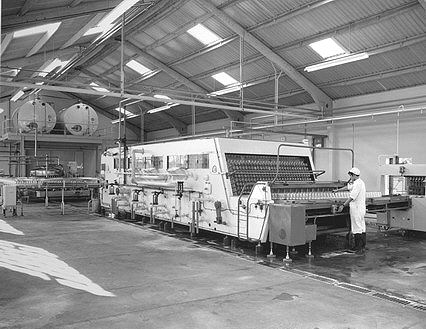 |
.
'Unigate Dairies'.....
the final chapter!
By 1985, The Rooksbridge production Dairy and all its retail depots
and outlets
had been bought by Unigate.
Unigate, a large National dairy company which had
previously been formed by the amalgamation of the old United Dairies and
the Cow and Gate Dairy.
With bottling plants and retail depots nationwide, those in the south and
west were at, Totnes in Devon, St Erth in Cornwall, Marshfield in Sth Wales, Hanworth
in Surrey and several smaller plants along the South Coast. Unigate also
operated the St Ivel brand. producing Yoghurts, butter, cheese and other dairy
products at factories at Evercreech and Wooton Bassett etc.
The acquisition of the Rooksbridge operation gave Unigate a greater presence in
Somerset area, to add
to its national coverage of milk sales and dairy products etc.
Soon after Unigate took over the dairy, many changes were made to many
of the existing buildings and production processes.
'Brent Holme' the former managers House, was now being used for offices. A
large extension was added to this and became, the 'Wessex Area' headquarters
for all Unigate operations in the South West. At about this time a fully
automated carton and poly-bottle filling area was built where the old
cheese room had been. The building also housed new offices for
production, transport, engineering and laboratory managers etc.
The Rooksbridge dairy was now distributing over 26000
gallons of milk daily to retail depots extending to the whole of Somerset,
Parts of Devon, South Gloucester and into Wiltshire.
In addition to the former Horlicks retail depots, the dairy was also now
supplying the three original Unigate depots in Bristol, at Ashton Gate, St Phillips and
Stoke Bishop. And also at Bath and Swindon. The Rooksbridge dairy also helped to supplement
production of the Totnes and Marshfield Dairies.
Wholesale deliveries in non returnable containers were also being
delivered direct to shops including large contracts with Tesco and Sainsburys
supermarkets daily.
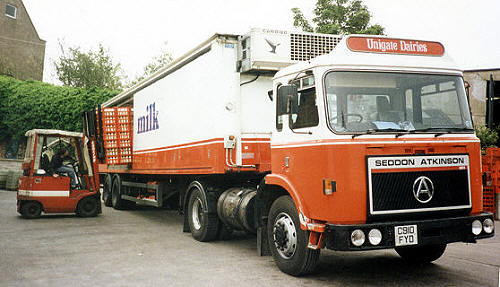 |
A 42 ton refrigerated trailer
carrying up to 1000 crates being unloaded at Stoke Bishop.
Bristol
Photo. J Rigarlsford |
Sadly, under Unigate, the investment in expansion
and the viability of the Rooksbridge site was not to last. As with many
dairy companies, foreign imports and the decline in doorstep sales and
the increasing demands from the supermarkets for lower milk prices and
produce, was to lead to crisis for much of the dairy industry and
indeed the dairy farming and agricultural economy of the country in general.
To try to keep going, Unigate sold off its retail and production
dairies north of the M4. Concentrating its efforts on its production and
retail operations in the South and West of England. Of these, gradually
all the production dairies along the South Coast at Worthing, Portsmouth, Southampton
and Bournemouth etc. would eventually be shut down.
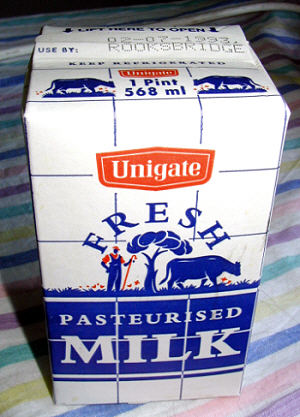 |
At the end of production, on the last day
at the Rooksbridge dairy. A few empty commemorative
cartons dated 02-07-1993 "ROOKSBRIDGE" were run through the
machine before it was finally switched off.
(I managed to grab one)!
Photo: J Rigarlsford. |
The fateful day for the dairy at Rooksbridge came in
July 1993. After over 120 years, production ceased at Rooksbridge on July 2nd. The Rooksbridge
production and any moveable equipment was shared between the remaining Unigate
bottling factories at Totnes in Devon and Marshfield in South Wales.
Even this could not save a once huge company such as
Unigate as a productive dairy operation. It eventually sold out its
liquid milk division to Dairy Crest in 2000. Even the St Ivel operations
at Evercreech, Wooton Bassett, St Erth and Totnes were later reduced or closed
down.
While other national dairy companies phased out doorstep
deliveries, Unigate vowed to keep them going. So far, Dairy Crest
has continued the doorstep delivery rounds. (But who knows
for how long)?
Sadly, I believe what is left of the company now goes
under the name of 'Uniq' and makes sandwiches for 'Marks and Spencer'!
Mendip Industrial Estate.
The old dairy site lay empty and declined badly for a couple
of years, suffering from unofficial visits by gypsies, scrap merchants
and other vandals!
| In 1995 the site was bought and developed as an Industrial
Estate by Malcolm King Estates.
Malcolm King
piloting his private helicopter into the estate on one of his
regular visits.
Photo: J Rigarlsford |
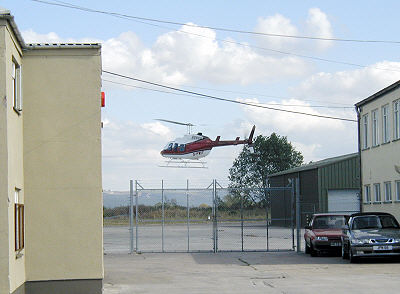 |
Uncannily, The first small company to set up on the new site
is
a cheese packaging operation. Its Unit happens to occupy what was once the
old cheeseroom area! So cheese has come back to Rooksbridge in a
roundabout way!
The other main occupant of the site at the time was 'Hillcrest' a
company that repaired and serviced Ex fleet hire cars in preparation for
auction etc.
Regrettably, with the site containing hundreds of vehicles, security was
a big problem.
Eventually 'Hillcrest' folded.
Mendip Business Park
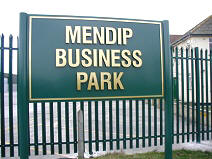 |
In 2003 the site was acquired and developed further by Tim
Roper of Mendip Estates.
Photo:
J Rigarlsford |
Security and renovation of the existing buildings were
improved. Many of the buildings such as the former bottling hall
and offices etc were divided into smaller units and a number of new
units built.
This has brought a number of diverse businesses and new
employment to what was the old dairy site.
These include, Engineering, Joinery, Computer, Heavy
plant and forklift training, Organic food producers etc. among many others
which can be found in the business page
of this website.
To be continued.....
|